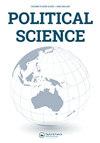对拉丁美洲管理机构的信任
IF 1.2
4区 社会学
Q3 POLITICAL SCIENCE
引用次数: 0
摘要
到20世纪末,独裁政权、内战和排他性政党制度的结束,是人们对拉丁美洲民主持乐观态度的真正原因。一旦围绕转型的兴奋情绪消退,向开放市场经济转型的冷酷现实将该地区推入代表性危机。也就是说,拉丁美洲的政党、民选官员和选民为实现代表性、问责制、有效的公民权利、,和法治(除其他外,弗朗西斯·哈戈皮安的《政权更迭后:南美洲的威权遗产、政治代表权和民主未来》;豪尔赫·多明格斯的《拉丁美洲的代表权危机》;肯尼斯·M。罗伯茨的“拉丁美洲政党与社会的联系和民主代表”;Scott Mainwaring的《安第斯山脉的代表权危机》)。在许多拉丁美洲国家,2019年的抗议活动(再次)引发了普遍的不安。新冠肺炎的全球大流行暂时结束了这一酝酿中的局势,但可能加剧了该地区的代表性危机。政治信任被视为民主可行性的晴雨表,已成为民主化的制度、行为和文化理论中的关键。尽管“政治信任”可以指无数的机构,但我们在概念上将其局限于政府、立法机构、政党、地方政府、司法机构、警察、军队和公务员/官僚机构。我们承认,建立在大卫·伊斯顿政治制度支持概念基础上的研究传统(《政治生活的系统分析》,1965年;《政治支持概念的重新评估》,1975年)认为,总统对民主的认可和满意度在概念上与政治信任相似。然而,我们之所以区分这些概念,是因为经过几十年的辩论,对民主的满意度仍然处于概念和经验的边缘。此外,21世纪初行政审批项目和其他项目的工作在理论上与政治信任不同,因为它考虑了总统这一个人的特征(如性别、意识形态)和行为(如丑闻、行政命令),而不是更广泛的机构。我们也承认Gabriel A.Almond和Sidney Verba的《公民文化》(1963)的传统,该书分析了人际信任和政治信任。不幸的是,该地区对人际信任的研究落后于对政治信任的研究,而且,如果说有什么不同的话,那就是更密切地关注亲社会性的多学科工作,而不是文化主义传统。总之,在本文引用的作品中,出现了人际信任、总统认可以及对民主的支持和满足。但我们认为它们在概念上与政治信任不同,并认为与政治信任相关的学术进步值得单独对待。学者们投入了大量资源来衡量政治信任,对其驱动因素进行理论化,并对其影响进行建模。本文探讨了这三个方面的进展。一路走来,它突出了重大突破和悬而未决的问题。本文章由计算机程序翻译,如有差异,请以英文原文为准。
Trust in Latin American Governing Institutions
The end of dictatorships, civil wars, and exclusive party systems by the close of the 20th century was a genuine cause for optimism about democracy in Latin America. Once the euphoria surrounding transitions subsided, the cold realities of transitioning to open market economies thrust the region into a crisis of representation. That is, Latin America’s parties, elected officials, and voters struggled mightily to achieve the democratic ideals of representation, accountability, effective citizenship rights, and rule of law (inter alia, Frances Hagopian’s “After Regime Change: Authoritarian Legacies, Political Representation and the Democratic Future of South America”; Jorge Domínguez’s “Latin America’s Crisis of Representation”; Kenneth M. Roberts’s “Party-Society Linkages and Democratic Representation in Latin America”; Scott Mainwaring’s “The Crisis of Representation in the Andes”). In many Latin American countries, a general malaise set in that bubbled over (again) with protests in 2019. COVID-19’s global pandemic placed a temporary lid on this simmering situation but likely exacerbated the region’s crisis of representation. Viewed as a barometer for democratic viability, political trust has become a lynchpin among institutional, behavioral, and cultural theories of democratization. Though “political trust” could refer to myriad institutions, we conceptually circumscribe it to governments, legislatures, political parties, local government, the judiciary, the police, the military, and the civil service / bureaucracy. We acknowledge that a research tradition built on David Easton’s conception of political system support (A Systems Analysis of Political Life, 1965; “A Re-assessment of the Concept of Political Support,” 1975) views presidential approval and satisfaction with democracy as conceptually kindred to political trust. We nevertheless distinguish these concepts because satisfaction with democracy remains in conceptual and empirical limbo after decades of debate. Moreover, early-21st-century work from the Executive Approval Project and others diverges theoretically from political trust by considering characteristics (e.g., gender, ideology) and actions (e.g., scandals, executive decrees) of a single person, the president, as opposed to institutions more broadly. We also acknowledge the tradition of Gabriel A. Almond and Sidney Verba’s The Civic Culture (1963), which analyzes interpersonal trust alongside political trust. Research on interpersonal trust in the region has, unfortunately, lagged behind research on political trust and, if anything, has hewn more closely to the multidisciplinary work on prosociality than the culturalist tradition. In sum, interpersonal trust, presidential approval, and support for and satisfaction with democracy arise in the works cited in this article. But we view them as conceptually distinct from political trust and judge the scholarly advances related to the latter as worthy of separate treatment. Scholars have invested vast resources into measuring political trust, theorizing its drivers, and modeling its implications. This article explores advances on those three fronts. Along the way it highlights major breakthroughs and unresolved questions.
求助全文
通过发布文献求助,成功后即可免费获取论文全文。
去求助
来源期刊

Political Science
POLITICAL SCIENCE-
CiteScore
0.90
自引率
0.00%
发文量
13
期刊介绍:
Political Science publishes high quality original scholarly works in the broad field of political science. Submission of articles with a regional focus on New Zealand and the Asia-Pacific is particularly encouraged, but content is not limited to this focus. Contributions are invited from across the political science discipline, including from the fields of international relations, comparative politics, political theory and public administration. Proposals for collections of articles on a common theme or debate to be published as special issues are welcome, as well as individual submissions.
 求助内容:
求助内容: 应助结果提醒方式:
应助结果提醒方式:


